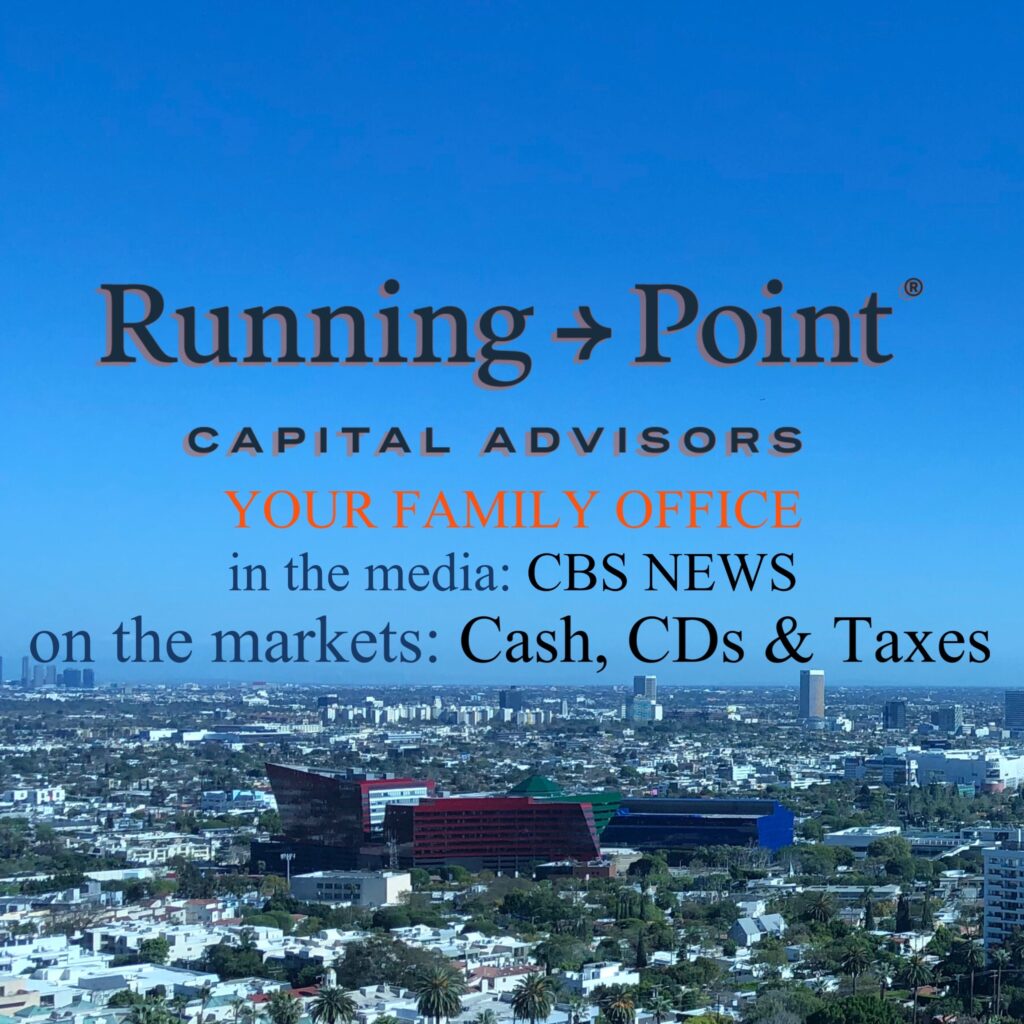Earning interest on your money?
Running Point and its chief investment officer, Michael Ashley Schulman, CFA, were quoted by CBS News in an article — by Aly Yale, “Do you pay taxes on CD earnings?” — regarding people seeking safe and stable investments for their cash.
Consider your financial goals
Carefully consider your financial goals and needs when choosing between a money market account and a CD; compare the interest rates, fees, and penalties proposed by different financial institutions to ensure you receive the best deal for your needs and also understand the FDIC insurance limits (for banks) or the NCUA insurance limits (for credit unions). You may be limited to only $250,000 on your total deposits (per bank or credit union) depending on how your accounts are titled.
Remember taxes!
The interest income you earn from a certificate of deposit (CD) is generally subject to federal income tax and, depending on where you live, state and local income taxes as well. Expect the bank or financial institution that issued the CD to report interest income earned to the Internal Revenue Service (IRS) on a Form 1099-INT. You’ll need to report this income on your tax return. However, if you have your CD in a tax-advantaged account, such as an Individual Retirement Account (IRA), you may not have to pay taxes on the interest income until you withdraw the funds. How much you pay in taxes will depend on your income tax bracket.
Note: Regardless of how long you lock up your money for in a CD, if your CD is not in a tax-advantaged account, you have to pay tax on any CD interest the year it was earned. Therefore, if you choose a 10-year CD, understand that you’ll pay taxes annually on income that you can’t access!
How much access do you need to your money?
Some banks penalize you 90 days’ simple interest for CD terms under 12 months and 180 days’ simple interest for terms longer than 12 months. In fact, Federal law requires a minimum penalty on early withdrawals from CDs, but sets no maximum penalty. Carefully review any specific account agreements and policies or ask a financial fiduciary for guidance.
Note: Federal law requires a minimum penalty on early withdrawals from CDs, but sets no maximum penalty.
T-Bills can often be a better option
Rather than money markets or CDs, we’ve recommended a portfolio of T-Bills and short-term Treasuries from 1 to 6 months in maturity for many of our clients with cash allocations. Depending on maturities selected, T-Bill portfolios can yield approximately 0.75% to 1.5% more than money market accounts and T-Bill income is not subject to state income tax whereas bank CD income and some of the higher yielding money market accounts that invest in short-term corporate and foreign securities are subject to state income tax. That can make a huge after-tax income difference for those in high tax states like California or New York.
Quoted article excerpt is below:
“For people in high-income-tax states such as California or New York, it may be worthwhile to compare CD yields to government-backed T-Bill and Treasury yields,” says Michael Ashely Schulman, partner and chief investment officer at Running Point Capital Advisors in El Segundo, California. “Income earned on them is not subject to state taxes.”

I’ve spent $40,000 on shoes and I have no place to live? I will literally be the old woman who lived in her shoes!
~Carrie Bradshaw, “Sex in the City”
Disclosure: The opinions expressed are those of Running Point Capital Advisors, LLC (Running Point) and are subject to change without notice. The opinions referenced are as of the date of publication, may be modified due to changes in the market or economic conditions, and may not necessarily come to pass. Past performance is not indicative of future results. Forward-looking statements cannot be guaranteed. Running Point is an investment adviser registered with the U.S. Securities and Exchange Commission. Registration does not imply a certain level of skill or training. More information about Running Point’s investment advisory services and fees can be found in its Form ADV Part 2, which is available upon request. RP-23-37


